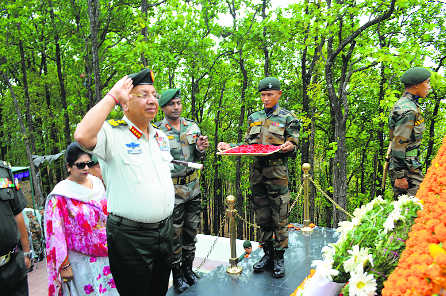
Jotirmay Thapliyal
Tribune News Service
Dehradun, June 8
Lesser known Khalanga War Memorial, the symbol of first battle of Anglo-Nepalese war, shot into prominence with Nepalese Army General visiting the memorial, which depicts the brave exploits and sacrifice of the Gorkhas.Nepalese General Rajendra Chhetri, who will be reviewing the passing out parade of Indian Military Academy on Saturday, led a Nepal Army delegation to the memorial in Dehradun on Friday. General officer accompanied by his wife Rita Chhetri and other Nepal Army senior officers took time to visit this memorial which symbolises the battle of Nalapani, which was the first battle of the Anglo- Nepalese War.General Chhetri, who laid the wreath at the memorial, lauded the efforts of Gorkha Samiti and the Archaeological Survey of India in maintaining the historical legacy of Gorkhas in the form of Khalanga memorial and said the Battle of Nalapani was one of the most important landmarks in the history of the Gorkhas.At the memorial, the delegation was briefed by Lt Gen Shakti Gurung, (retd), Madhu Gurung and Ram Singh Thapa, president of the Khalanga Vikas Samiti. The delegation also interacted with the members of the samiti. The visit was facilitated by the Indian Military Academy and 1/3 Gorkha Rifles.The Khalanga War Memorial in Dehradun has immense significance. It is probably the world’s first memorial erected by an Army for their opponent. It was the Britishers who constructed the Khalanga War Memorial in the memory of Major General Rollo Gillepie who led the attacking British troops as well as Captain Balbhadra Kunwar, as a mark of tribute to the courage of the Gorkhas.The Battle of Nalapani was the first battle of the Anglo-Nepalese War. In the battle, General Gillespie was killed on the first day of the siege while rallying his men. Despite considerable odds, both in terms of numbers and firepower Captain Balbhadra and his 600-strong garrison successfully held out against more than 5,000 British troops for over a month.
